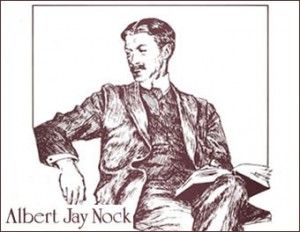Monday

Nock Notions
"[A]s government consolidates and strengthens, the power of independent moral judgment in the citizenry weakens; and this is one of the most interesting phenomena of our time."
Nock wrote those words in 1934, as he watched FDR unfurl massive efforts to weaken the independent moral judgment of Americans. That's one thing that people don't understand about Nock. For the godfather of libertarianism, the free market wasn't about economics, it was about morality: virtue, ability, objectivity. Sure, Nock believed that free markets were the best method of ordering things monetary, but as I plow through his works, I'm stunned by how little he wrote about the financial side of economics. It was the moral side of economics that interested Nock. Indeed, he repeatedly condemned a thing he called "economism," a state of mind that reduces all of life to the almighty dollar and the things it can buy. Nock himself wasn't remotely well-off. He simply didn't care about money.
When you think about it, such detachment to money and a loathing of authoritarian government go together well. Money, Simone Weil observed, is power's master key. Authoritarian government craves money--to the extent that it will even (for all practical purposes) counterfeit it (the Federal Reserve) or debase it (3rd century Rome). It's no surprise that the thing that craves power most is the thing that craves money most. But then on the flipside, authoritarian government weakens the moral judgment of its citizenry, with the result that the culture lapses into economism: a nearly-exclusive concern for the dollar. Materialism, of course, is the most pronounced characteristic of a weakened moral judgment. The conclusion: debased currency leads to a debased citizenry. The person who, like Nock, refused to allow himself to be debased became fiercely opposed to that thing that tried to debase him: the government.
It's interesting to think about spheres where the government has exercised the most influence: the inner-cities and the USSR. In both, government took care of the citizens' basic needs: food lines, food stamps, subsidized housing, free education. Yet in both, the citizenry became enormously debased, both giving rise to drug and gang cultures, both of which are materialistic (debased) to the core. Both also suffer from a kind of torpor: an existential laziness that pervades the atmosphere. I've never visited the old USSR, but I have seen lots of inner cities (south Chicago, Detroit, Cleveland, Harlem). The description of Russia coming out of Communism is very similar to what I've seen while slumming. Two entirely different worlds; two very similar environments; one common feature: authoritarian/paternalistic government.



